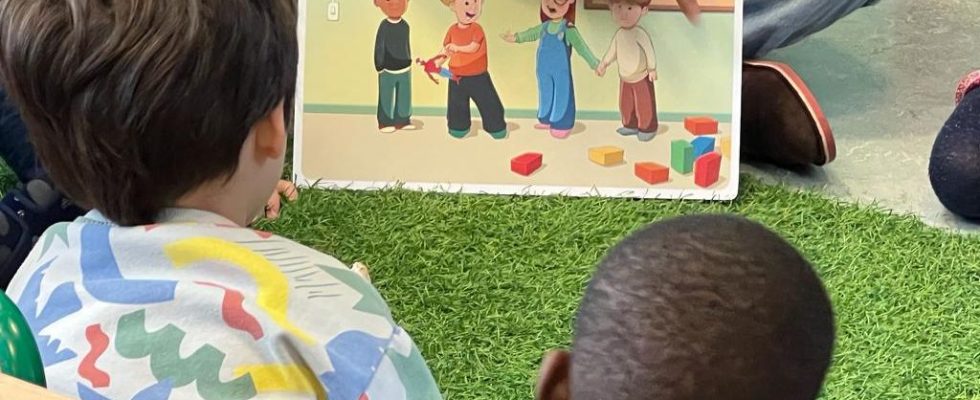They won’t all be friends, but at least good comrades. This is the government’s ambition for French students, even if the road will be long to achieve it. The Prime Minister, Élisabeth Borne, will present this Wednesday a plan to combat school bullying. Among the range of measures that she will announce, should include the development of empathy courses in nursery and elementary schools. Gabriel Attal traveled to Denmark last week to attend a session in a school. The country initiated these courses around twenty years ago, via the Fri for Mobberi (Free from Harassment) method. It is aimed at children aged 0 to 9 and is provided in 60% of nursery schools and 45% of elementary schools.
A system which is not unknown in France, since it has been tested since the start of the 2022 school year in 18 nursery schools in the 18th arrondissement of Paris and Saint-Ouen (Seine-Saint-Denis). And this year, the program has spread: it is now offered in around thirty establishments. In addition to the schools already launched, others located in the 19th and 20th arrondissements, as well as in Montreuil (Seine-Saint-Denis) and Eragny (Val-d’Oise) are concerned.
Lots of activities to become aware of others
Before starting, teachers receive 6 hours of training in the program. They are then free to choose between the different 20 to 40 minute workshops. “Example: the school teacher presents them with a discussion board on friendship or mutual aid, courage, saying “no”. The goal is to get them to discuss everyday situations so that they themselves find the solution to a problem and look at the world with someone else’s eyes,” says Margot Neuvialle, coordinator. Living together-Fri for Mobberi” for the Teaching League. Another possible activity: The teacher tells a story and a student draws with his finger on his neighbor’s back what he understands. “The first asks his friend for permission to use his back and thanks him for that. This teaches him to respect the other student and brings him closer to himself,” notes Brigitte Cervoni, national education inspector in charge of some of the primary schools in the 18th arrondissement of Paris.
Another game is regularly offered: posters representing emotions (anger, sadness, joy, fear, etc.) are displayed. The teacher then evokes a situation such as: “Hector takes the ball from Maya” and asks the children to position themselves in front of the poster representing the emotion experienced by Maya in this situation. “However, we see that the children do not place themselves in front of the same poster. It’s a way for them to realize that not everyone reacts in the same way to events,” comments Margot Neuvialle.
The mascot of these empathy courses, a bear cub also has an important role. “Children can bring it to a friend who has been hurt or who is grieving, in order to console them,” reports Brigitte Cervoni.
“Create a community of caring and respectful children”
It is never too early to act on school bullying, explains Margot Neuvialle: “It is important to intervene from the start of the child’s socialization, so that he develops skills to manage his emotions and understand those others. » An opinion shared by the educational psychologist Bruno Humbeeck: “Activating the child’s mirror neurons very early allows them to develop their emotional intelligence. »
A complementary system to the PHARe bullying prevention program, according to Brigitte Cervoni: “The ambition is to create a community of caring and respectful children. The sooner they learn to be good friends, the better they will be able to defend a student if he is bothered in the playground or report abuse if they are the victim. »
Beneficial effects already perceptible
Even if the experimentation of these empathy sessions is still recent in France, the first feedback is positive. Some children are already acquiring good reflexes: “A kindergarten student seeing two classmates arguing over a bike in the yard applied one of the conflict management techniques seen in class,” says Margot Neuvialle. And while one might have feared that only the children who were most comfortable speaking would intervene during these sessions, this is not the case, according to her: “Even inhibited children seek to participate. These workshops also have an impact on the development of oral expression skills.” The effects on the classroom climate are also felt, according to Brigitte Cervoni: “After recess, children are often tense. But practicing these activities when they return to class calms them down. »
Parents, informed of the system, also think more about their means of combating school bullying. “They became aware of the feeling of exclusion of students who were never invited to birthday parties. Or the repercussions when they speak badly about a family at school in front of their child,” indicates Margot Neuvialle.
Work to be planned over time
Still, these empathy courses are not a miracle cure. “For there to be a real impact, it is necessary to do one workshop per week. And to carry out long-term work, that is to say in kindergarten but also in elementary and middle school. As in Denmark, the psychosocial skills of students should be considered in France as core skills,” insists Bruno Humbeeck

